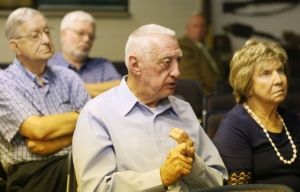Symposium focuses on PTSD
By Phyllis Moore
Published in News on August 28, 2018 5:50 AM

News-Argus/CASEY MOZINGO
Marine veteran Ray Clark asks a question during the lecture titled "The History of PTSD: How Cultural Narratives Affect the Patient Experience" given by Shena Eagen, assistant professor at East Carolina University, at the Charles B. Aycock Birthplace Saturday.
FREMONT -- Little-known fact: Former North Carolina Governor Charles B. Aycock's son, Lt. W.B. Aycock, committed suicide in 1938.
A contributing factor was a form of post-traumatic stress disorder, before it was known by that name.
Back then, the terminology was different. In Aycock's case it was "shell shock" he sustained while serving in the 321st Infantry, 81st Division. It reportedly left him totally disabled.
When Leigh Strickland, manager of the Gov. Charles B. Aycock Birthplace, stumbled upon the information while cleaning out some papers, she felt compelled to make the information count.
"For many doughboys, World War I did not end when they returned home," she said. "The lingering memories of the horrors they endured in the trenches became known as shell shock. Today we know it as post-traumatic stress disorder, or PTSD."
According to an announcement in the Rockingham Post, Strickland said W.B. Aycock's death reportedly occurred at his home in Raleigh on June 23, 1938, some 20 years after having served in World War I.
The birthplace is hosting a traveling World War I exhibit on North Carolina and the Great War.
As a lead-in to the exhibit, the state historic site offered a free symposium on Saturday, "A Lingering Shadow: From Battlefield Trauma in World War I to a Modern Perspective on PTSD."
In addition to being a sneak preview of the exhibit, Strickland said it was a timely opportunity to address a growing issue, especially for those who served in battle.
"There's no need to have this if we're not going to do something with it," she said.
The free symposium included several presentations, including "Shell Shock and War Neurosis: When Doughboys Returned from the Great War" by Timothy Reagin, a UNC-Greensboro Ph.D. candidate; East Carolina University assistant professor in bioethics and interdisciplinary studies Shena Eagen, speaking on "The History of PTSD: How Cultural Narratives Affect the Patient Experience"; and "The Never-Ending War: The Unseen Scars of Post-Traumatic Stress Disorder" by Ray Clark, Vietnam veteran and author of a memoir on the subject.
"I talk about what combat does to us," Clark said before his presentation, recalling the stigma attached to the lingering effects of PTSD.
Because of that, even though most of the words in the book are his, wife Laura also shared her side of things and he published it under her name.
He said he enjoys working with veterans and participating in events like the one this past weekend.
"It's good for me, too," he said.
Bill Boyd of Princeton is a chaplain with the U.S. Marine Corps League who counsels a lot of veterans and has a strong desire to learn everything he can about the subject of PTSD.
"I'm needful of it," he said. "There's not too much written on it."
Boyd said he looked forward to purchasing Clark's book, a gift for his grandson who is attending seminary.
"I served 10 years in the Marine Corps, then I went to seminary and into a tougher branch of service," he said with a chuckle, referencing his role as chaplain.
At 83 years old, though, he says he witnessed firsthand the toll war can take on someone.
"I saw signs of PTSD long before I knew what it was," he said. "My father was a World War I veteran. I learned about the difficulty with shell shock.
"My father attempted suicide three times. He died in his bed at 89."
Thomas Pope of Goldsboro has been diagnosed with PTSD, even though he never served in the military or went off to war.
Growing up amid verbal, emotional and sexual abuse impacted him greatly and affected the person he became.
Instead of remaining bitter, though, he has been working with a retired veteran at his church, "using the word of God to change the mind," he said.
"I pray every day. I study," he said, along with participating in ministries and such programs as Celebrate Recovery and Alcoholics Anonymous.
He has discovered he has a servant's heart, he says, and devotes his life to giving.
"Instead of focusing on my own issues, I focus on helping others and now I can reach out to others," he said. "I wanted to come (to this) and maybe talk to others and cheer others up or I can hear something that might help me down the line."
Fremont Mayor Darron Flowers' reason for attending the event was prompted by his longtime fascination in history since it was his minor at East Carolina University. Coupled with that is an interest in the subject of PTSD.
He recalled growing up during World War II, when shell shock was a commonly used phrase.
"It actually was attributed to something that happened right then and it was over with," he said. "You didn't associate it with a lifelong problem."
The symposium was sponsored by the Fremont Rotary Club, of which Flowers is a member and Strickland is president, as well as the VFW Post and Aycock Birthplace.
The traveling exhibit features two mannequins, Strickland said -- one wearing a doughboy uniform with a gas mask, the other of a nurse wearing a Red Cross uniform.
"We have a trench, because of the trench war, with barbed wire, and informational panels of North Carolina's involvement in the war," she said. "We also have other artifacts from World War I, guns and a German telephone."
The exhibit is free and open to the public. It will be offered from Aug. 28-Sept. 22. Birthplace hours are Tuesday through Saturday, 9 a.m. until 5 p.m.
